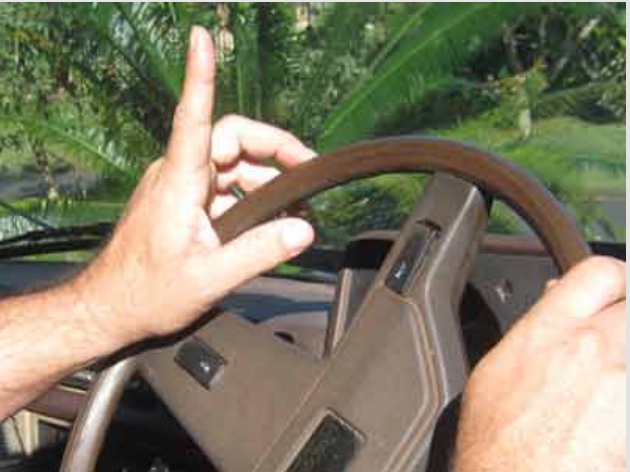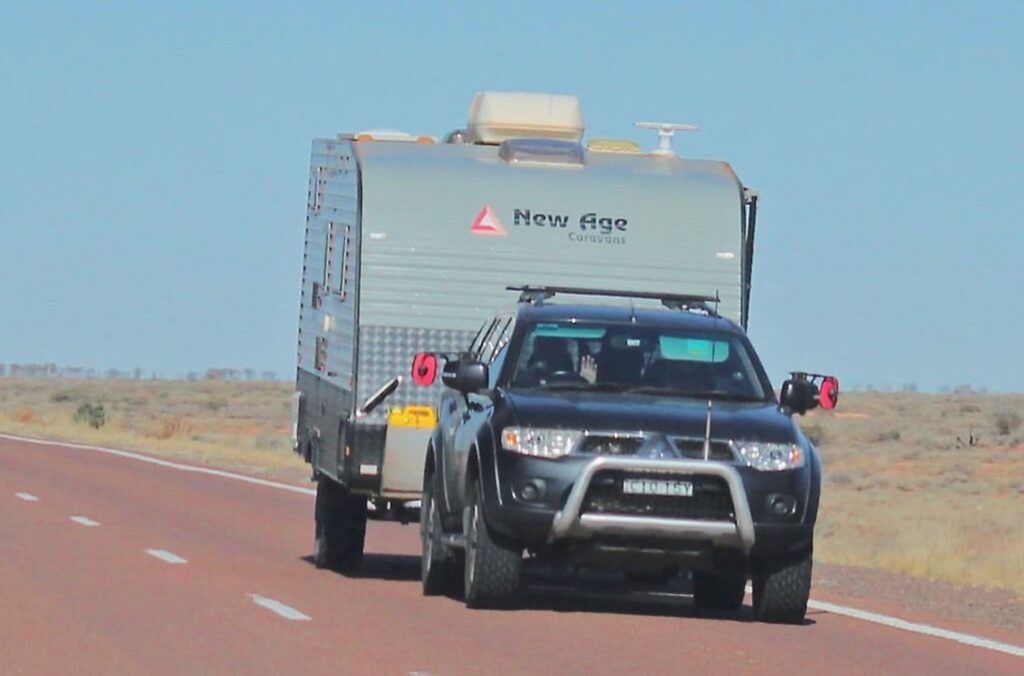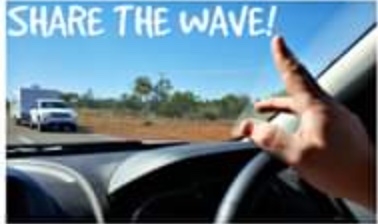As we have travelled around Australia, one of the things I have picked up on is waving between caravaners as they pass each other. Anyone who has travelled on more remote roads would have waved at fellow travellers regardless of how they travelled. It is an unwritten road rule, isn’t it? No one is above this law, right?
There is so much unsaid with the wave. It’s “g’day fellow traveller, where have you been, where are you headed? Travel safe.” It is a way of acknowledging each other and letting them know you were okay. After all, in the middle of nowhere, we can all feel vulnerable. It is a form of country civility lacking in the more populated and busy city streets. It is always appreciated and expected, or is it?
I recently read that “the common finger raising gesture is an acknowledgement of common humanity which shows our innate desire to interact with those on a similar adventure”. If true, it would explain the propensity for most, not all, caravaners waving to each other as they pass. Lifting a finger just might make someone’s day. It also helps improve the mood. The type of vehicle people drive gives them an identity and influences who they wave at.
With international travel restricted, there seems to be more and more caravaners on the road. Apparently it is difficult to buy a caravan, either new or used, as the demand is so high at the moment. It means there are a lot of newbies towing a van. Many have to brush up on their waving skills to honour that Australian tradition of acknowledging fellow travellers on roads and highways.
However, with so many more caravans one the road these days, some caravaners say they can’t be bothered acknowledging a complete stranger heading in the opposite direction. Fair enough, but I would bet they would appreciate help from a complete stranger if they are broken down hundreds of miles from anywhere, and in desperate need of assistance.
I must admit when we started in February 2020, as a novice towing a caravan, I wasn’t much of a waver to other caravaners. But as we madly drove up the Newell Highway towards the end of March 2020, to return to Queensland before borders closed and ride out the nationwide COVID-19 lockdown, we passed many caravaners heading south, heading back home. There was a lot of waving in recognition of the situation we all found ourselves in and wishing each other a safe trip in the madness. I quickly got into the groove to reciprocate a wave. It is partly because of the guilty feeling that the other driver may think you are a snob if you don’t wave back. But also because it is such a simple sign that becomes automatic.
The type of wave is important too. Does a slight twitch of the finger indicate a lack of sincerity, and a full-blown frantic waving of the hand a bit over the top, especially from the passenger who has both hands free, and waves like a windscreen wiper on high speed?
Some people wave at anything that moves, and they are considered new to the game. It is interesting to know how long they keep that caper up. Some drivers claim that their waving “instincts” aren’t always on, and they only wave when focused. Others are selective in their type of waving – a raise of the entire hand to rigs like theirs, and only the finger twitch to the other grey nomads. Regardless of whether it is the full-blown hand or just the finger or three, the movement in acknowledgement is a form of salute – a gesture or polite recognition.

I wonder if there is some kind of pecking order within the caravan waving community. It seems that the majority of grey nomads towing a caravan prioritise their salute at other similar grey nomads but stop at saluting motorhomes, camper trailers and rental cars.
When we started travelling after the nationwide lockdown, I happily continued to salute passing caravan drivers. In outback Queensland, they too returned the salute. There were a few recalcitrant ones, but not many.
Returning down the Newell Highway to Victoria in February this year, there were a higher number of non-wavers. I kept wondering why that would be. I decided to do some robust research to find out and perhaps understand the psychology of a non-waver.
I noticed that you hardly got any return salutes before about 11 am from a passing caravaner, even a fellow grey nomad. This is the period not long after they have packed up, hitched the van and set off. My theory is that a couple of factors conspire to make the driver less likely to salute back at this time. The first is the husband (invariably, over 90 per cent of caravan drivers are males) has fought with the missus when hitching and setting off, and is a little grumpy. The last thing he wants to do is suddenly turn all friendly and wave back. The second is he hasn’t stopped and had his morning coffee. He just doesn’t have the energy to return the salute.
Driving into South Australia allowed us to carry out further research. I found that the greater distance away from bigger towns, the more waves you got. For example, when I crossed the border into Northern Territory, everyone waved, and it was great. However, as I got closer to Darwin, the waving became sporadic.
This was confirmed on a recent long weekend holiday heading south from Darwin on the Stuart Highway towards Katherine. We passed a constant procession of caravans heading north. I gave up saluting, not because my hand or finger was getting tired (although it can be tiring waving to nearly 90 caravans in a one hour stretch as we experienced between Pine Creek and Katherine), but because no one would salute in return. I passed many caravaners I call ‘weekend warriors’ as they occasionally take their van out during holiday periods, Most, but not all, carry kid’s equipment indicating kids in the car. Could it be that they are hell-bent on getting to their site before the rush or are in a mad desire to get home after a gruelling holiday because the kids are driving them mad, or they simply don’t see a need to wave and refuse to participate? Another plausible explanation is they are all members of a secret “weekend warriors” club that bans waving.
A friend of ours believes that driving on the Stuart Highway is so dull that travellers listen to podcasts or the radio and are so focused on that activity that they don’t realise people are waving at them. That is not only an unfair judgement of the Stuart highway, but my research found that no matter what road they are on, some caravaners just didn’t wave back.
Perhaps it is an age demographic thing. The older grey nomads in retirement get excited when they see another caravan passing by, while the younger drivers with their kids screaming and arguing in the back of the car have other distractions. Some drivers worry about getting RSI from the constant need to salute. A simple solution would be to purchase a waving hand from a $2 shop and suction cap it to the windscreen.

I met a West Australian who boasted that all caravaners from their state wave. She was most indignant when I told her that my extensive research had revealed that only 20-30 per cent of caravaners waved. What is the point of waving if it won’t be reciprocated, she retorted? And that is the problem, as perhaps everyone is waiting for the other to initiate the salute. They simply got sick of waving without any response. I know I do.
One person I met from Victoria at a free rest area scoffed at me when I asked about waving. He said he would be exhausted if he waved at every van that passed him. He has a point, as there are many caravaners on the road, at least in the Top End during winter when we were there.
I read a comment online where speed was an influence on whether there was a reciprocating salute or not. If travelling at only 80 kilometres an hour, he believed salutes were ignored. However, I fail to understand how or why the oncoming person could make a decision to wave based on speculating your oncoming speed.
As the responses to my wave have waned significantly, I have now become a responder to waving, not an initiator. I have learnt that the prelude to a wave is when someone moves their hand to the top of the steering wheel as we approach each other. I am now confident about who will wave and who will not. Similarly, they are confident when they see my hand move on the steering wheel in anticipation. I now prepare myself to respond to a wave. When there is no hand movement, I know they won’t wave back, so I don’t bother.
How can that nexus be broken to keep the friendly unwritten law of waving alive?
Do you wave, or do you wait and respond to a wave, or you just don’t wave at all? Or do you only wave after 11 am when your mood has lightened up after the hitching up argument, and you have stopped and had your coffee?
Here is a great poem about waving I found online:
There are waves that crash upon the beach that’s sandy
The queens Royal wave looks rather dandy
our Australian flag we can wave with pride
Wave it up high and side to side
But there is one wave that I am sure you all know
And it’s when you have your caravan in tow
Another van passes and both drivers give the sign
A finger or hand on the wheel all primed
Sometimes even the passenger will raise their palm
Wishing the fellow vanner to come to no harm
Cause it’s a kindred spirit as we cross our great land
A comfort as each of us raise up a hand
Sometimes you might have one van after another
Just leave that hand up and mass wave each other
And when you are traveling through our major towns
We know you concentrate we can tell from the frown
There are lines of traffic as peak hour is near
And you wish to change lanes and glimpse over in fear
No time now to wave and we all understand
Cause city drivers are a different brand
But as the traffic thins and the scenery changes
Put up your hand and don’t be a stranger
Still give the sign and show the other vans
You’re a true blue Aussie who has joined the club of caravans[1]
[1] Debbie Hutchison 21 June 2017 www.greynomads.com.au

Hi Robert.
We are currently travelling our beautiful country Australia.
I was just asking my husband if there are different waves to fellow travellers travelling in the opposite direction. I came across your fantastic article and read it out loud while my husband was driving.
Thanks
Patricia